高中英语必修三unit1 Festivals around the world课件(134张PPT)
文档属性
| 名称 | 高中英语必修三unit1 Festivals around the world课件(134张PPT) | 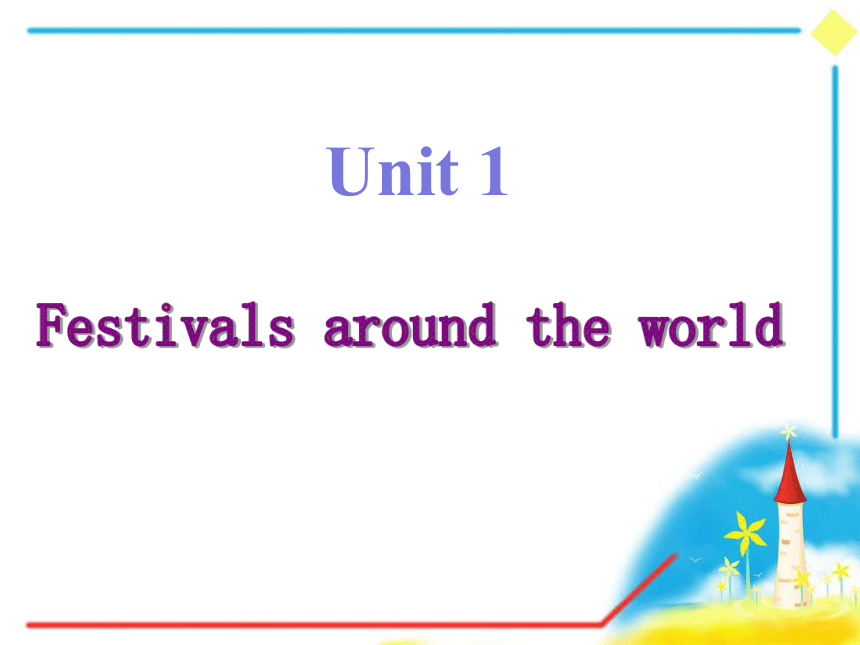 | |
| 格式 | zip | ||
| 文件大小 | 3.7MB | ||
| 资源类型 | 教案 | ||
| 版本资源 | 人教版(新课程标准) | ||
| 科目 | 英语 | ||
| 更新时间 | 2019-02-20 19:42:15 | ||
图片预览


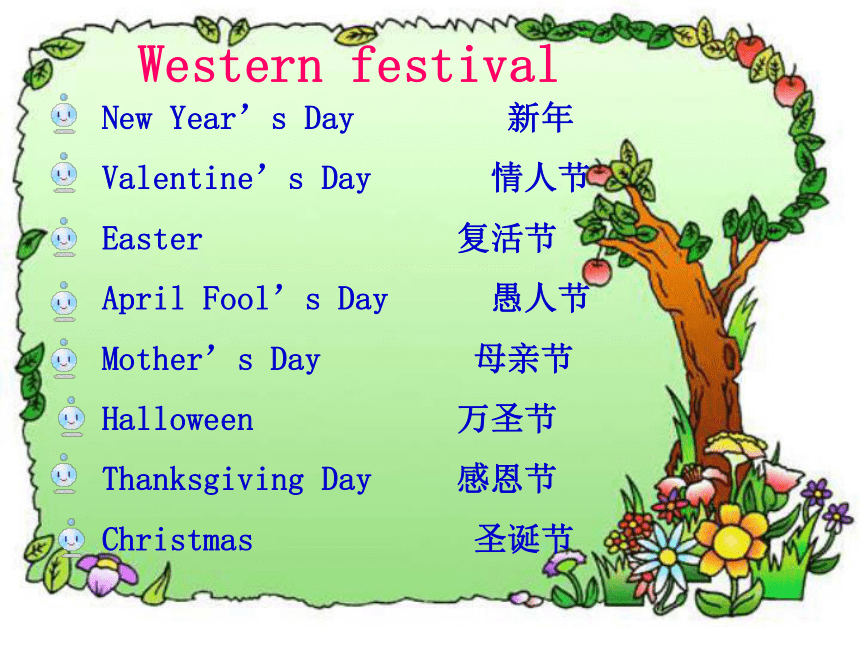
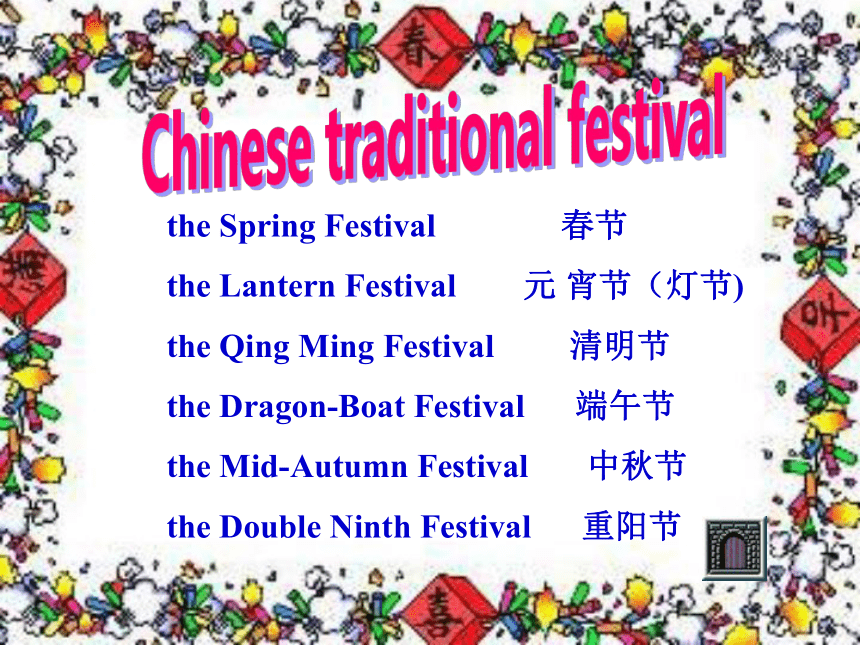


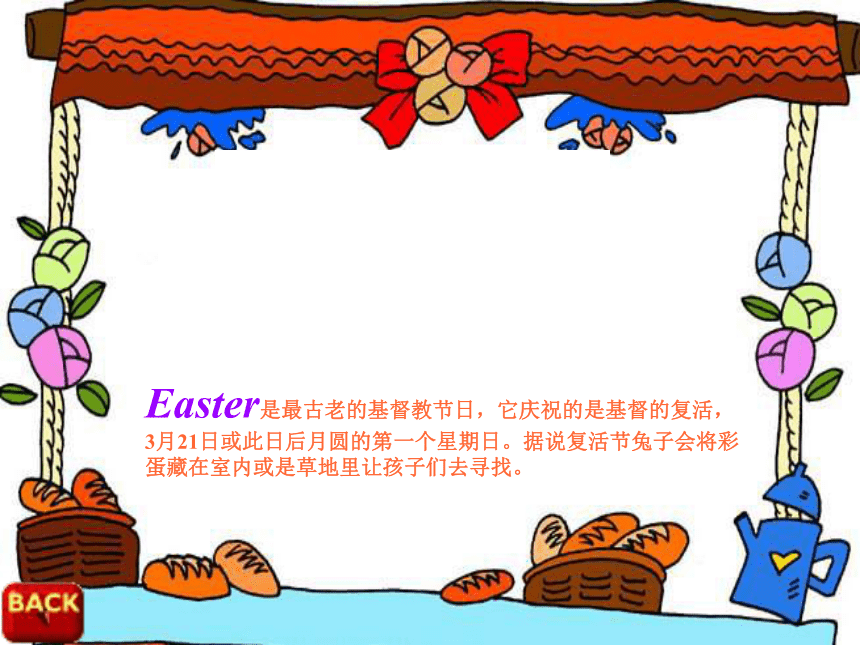
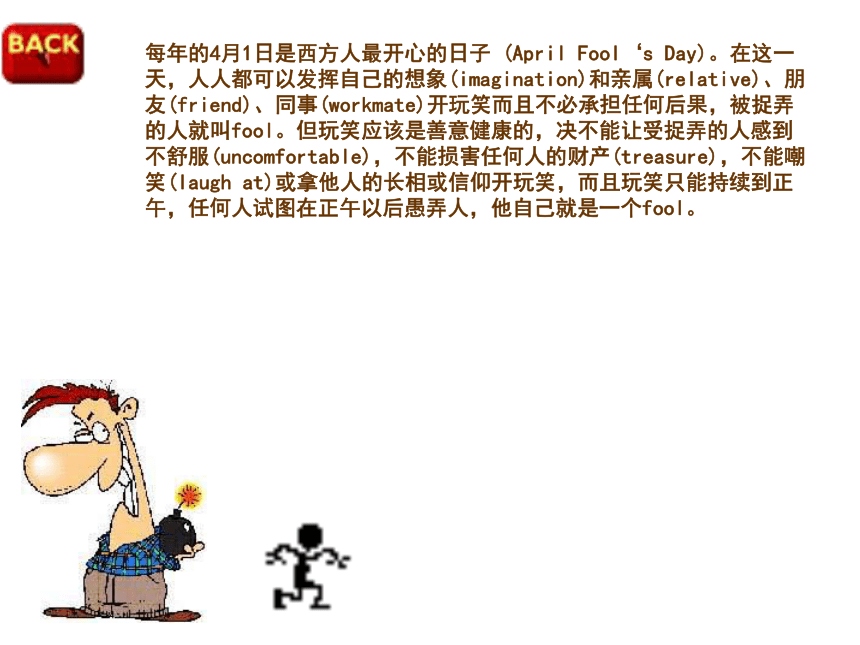
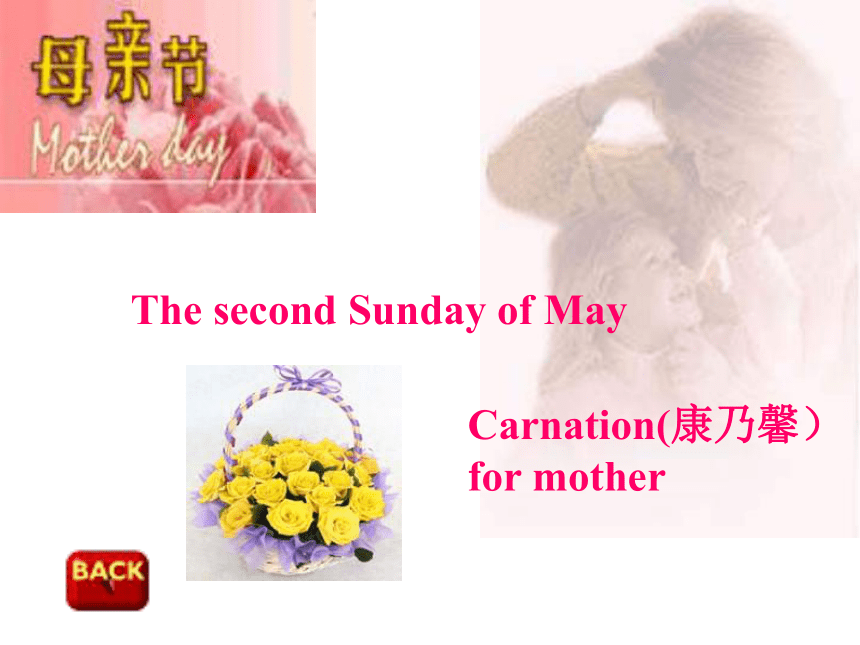

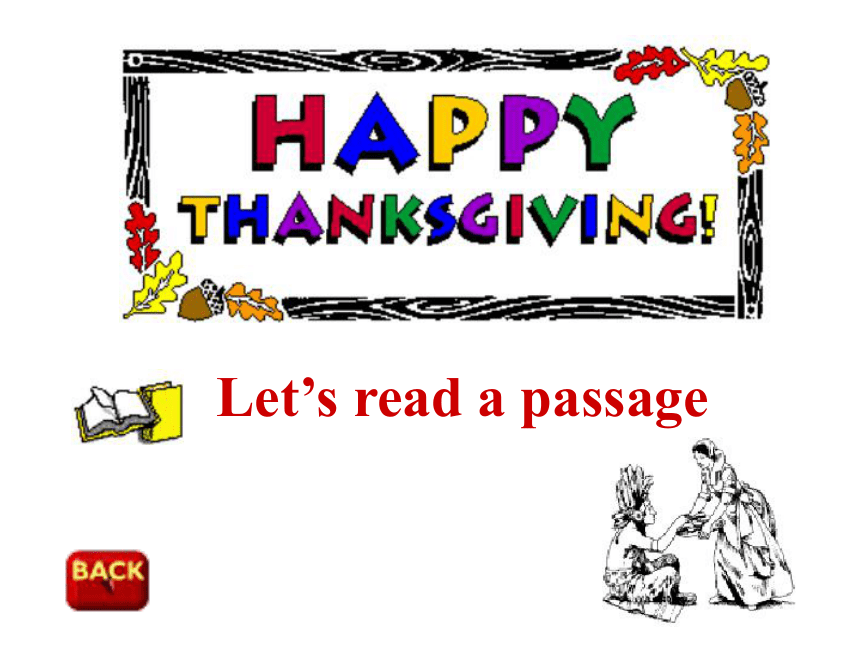

文档简介
Unit 1
你了解中外节日吗
Do you know about Chinese and western festivals?
Western festival
New Year’s Day 新年
Valentine’s Day 情人节
Easter 复活节
April Fool’s Day 愚人节
Mother’s Day 母亲节
Halloween 万圣节
Thanksgiving Day 感恩节
Christmas 圣诞节
the Spring Festival 春节
the Lantern Festival 元 宵节(灯节)
the Qing Ming Festival 清明节
the Dragon-Boat Festival 端午节
the Mid-Autumn Festival 中秋节
the Double Ninth Festival 重阳节
New Year’s Day 中西方都有这个节日,有什么异同呢?
Valentine’s Day February 14th
VALENTINE SYMBOLS
HEART
RED ROSE
Easter是最古老的基督教节日,它庆祝的是基督的复活, 3月21日或此日后月圆的第一个星期日。据说复活节兔子会将彩蛋藏在室内或是草地里让孩子们去寻找。
每年的4月1日是西方人最开心的日子 (April Fool‘s Day)。在这一天,人人都可以发挥自己的想象(imagination)和亲属(relative)、朋友(friend)、同事(workmate)开玩笑而且不必承担任何后果,被捉弄的人就叫fool。但玩笑应该是善意健康的,决不能让受捉弄的人感到不舒服(uncomfortable),不能损害任何人的财产(treasure),不能嘲笑(laugh at)或拿他人的长相或信仰开玩笑,而且玩笑只能持续到正午,任何人试图在正午以后愚弄人,他自己就是一个fool。
The second Sunday of May
Carnation(康乃馨) for mother
October 31th
一年中最“闹鬼”的这天夜里,孩子们穿戴上各种服饰和面具参加万圣节舞会,这些舞会四周的墙上往往悬挂着用纸糊的巫婆、黑猫、鬼怪和尸骨,窗前和门口则吊着龇牙裂嘴或是面目可憎的南瓜灯笼。
Let’s read a passage
Christmas is a time for Families, Fun, and Festivities! A time of family gatherings and holiday meals. A time for Santa, stars, ornaments, gifts, twinkling lights and singing carolers.
Do you know how Americans celebrate their Christmas?
1. Festival are meant to celebrate important times of year.
mean 的用法
1). mean doing sth.
mean doing sth. 的意思是“意味着(必须要做某事或导致种结果)”, 其主语通常是指事物的词。
1.This new order will mean working overtime.
2.The injury could mean him missing next week’s game.
2). mean to do sth.
mean to do sth. 的意思是“打算或企图做某事”,其主语通常是表示人的名词或代词,=intend to do sth
3). mean sb. to do sth.
mean sb. to do sth. 的意思是“打算让某人做某事”,也可以用于被动结构。
His father meant him to be an engineer.
A and B are meant for each other.
4). Sth be meant for+n./to do
意思是“打算作……用,被用作…的目的”
The chair was clearly meant for a child.
Festivals are meant to celebrate important times.
In some parts of London, missing a bus means _____ for another hour.
A. waiting B. to wait
C. wait D. to be waiting
句意为:在伦敦的一些地方,错过一班公共汽车意味着再等一个小时。
A
想一想
n. celebration
v. 庆祝;祝贺
思考:你能否设想一个生活场景来区分celebrate与congratulate?
adj. celebrated
Celebrate sth. = in celebration of sth.
Congratulate sb. (on / upon sth.)
= congratulations to sb. on sth.
2. Discuss when they take place, what they celebrate and what people do at that time.
讨论它们(中国节日)什么时间进行,庆祝的是什么事件,和人们在那天所做的事。
take place 发生;举行
① The performance didn’t take place after all.
演出终于没有进行。
词语辨析
take place;happen;occur;break out;come about
它们都没有被动语态。
①take place 事先计划安排好的事情。
②happen 一切客观事物或者偶然的未能遇见的事件。
③occur同happen,指偶然的未能预见的事情,也表示“突然想到…”。
④break out 多指有负面影响的事情发生,如灾难、战争等。
⑤come about 中性词,通常要与how连用。
B.选用上述单词或短语完成下列句子
(1)I ____________to be at the gate when the guests arrived.
(2)Just then an idea ____________to me.
(3)Can you tell me how the accident ____________?
(4)World War II ____________ in 1939.
(5)The meeting ____________ at 8∶00 as planned.
?句型:It (so) happens that...(这么)碰巧……, 偶然……
It occurs to sb.that...某人突然想到……
答案:(1)happened (2)occurred (3)came about (4)broke out (5)took place
in place
放在原来的位置,就位
in place of
代替,用……而不用……
take one’s place
找某人接替某人的位置
Great changes ___ in the rural areas in the last two decades.
A. have taken place
B. took place
C. have been taken place
D. are happening
A
take place 不能用于被动语态中,句中短语 in the last two decades 可确定句子的时态为现在完成时。
英语语法的核心原则:一山不容二虎
句子 谓语动词
主干:主+谓+宾
主干:主+系+表
第一片树叶:介词短语
第二片树叶:从句
第三片树叶:非谓语
英语语法树状图
英语句子的种类
简单句 (simple sentence)
并列句 (compound sentence)
复合句 (complex sentence)
简单句的五种基本句型
The weather is very cold.
主语+谓语(连系动词)+表语
He laughed.
主语+谓语(vi.)
I like Chinese food.
主语+谓语(vt.)+宾语
She taught them physics.
主语+谓语(vt.)+间接宾语+直接宾语
We must keep the room warm.
主语+谓语(vt.) +宾语+宾语补足语
并列句
把两个或几个简单句用并列连词连接起来。
I turned on the TV. My sister and I watched it.
I turned on the TV and my sister and I watched it.
I bought my sister a present. She didn’t like it.
I bought my sister a present,but she didn’t like it.
并列句
并列句
常用并列连词:
平行并列连词:
转折并列连词:
因果并列连词:
选择并列连词:
and, both…and, not only… but also, neither…nor
but, however, while, yet,
or,either…or
for, so
复合句:主句+从句
名词性从句
定语从句
状语从句
主语从句
表语从句
宾语从句
同位语从句
名词性从句在功能上相当于名词, 在复合句
中能担任主语、宾语、表语、同位语等。
主语
{
His job is important.
What he does is important.
表语
This is his job.
This is what he does every day.
{
宾语
I don’t like his job.
I don’t like what he does every day.
同位语
I don’t know about the man, Mr. White.
I don’t know about the fact that he is a teacher.
Practice time:指出下列各名词性从句的种类。
1. At lunchtime, the radio weatherman reported that the mist would become a thick fog in the afternoon.
2. She wondered if the buses would still be running.
3. The truth is that the fog is too thick for the bus to run that far.
4. She sensed that she was being watched by a tall man in a dark coat.
5. When we will start is not clear.
6. I had no idea that you were her friend.
宾语从句
宾语从句
表语从句
宾语从句
主语从句
同位语从句
I know him .
2. I know who he is .
主语
谓语
宾语
(简单句)
主语
谓语
宾 语 从 句
连词
从句主语
从句谓语
主 句
(复合句)
句子做宾语就是宾语从句,跟在及物动词或介词后
句子结构:
主句 +连词(引导词)+ 宾语从句。
宾语从句的连接词
句子类型
that
宾语从句结构完整,意义完整,什么都不缺,that没有汉语意义,只起连接作用,可以省略。
if/whether (是否)
特殊疑问词
宾语从句结构不完整,意义不完整,宾语从句缺少主语,宾语用代词引导从句;宾语从句缺少状语,用副词引导宾语从句。
代词
副词
引导词
宾语从句结构完整,意义不完整,whether/if有汉语意义,不可省略。
3. Festivals and celebrations of all kinds have been held everywhere.
of all kinds 各种各样的
① That kind of question is very difficult to answer.
= Questions of that kind are difficult to answer.
那类问题是很难解答的。
Practice
① Books of this kind ____ (sell) well in the bookstore.
② This kind of books ____ (sell) well in the bookstore.
①句中谓语动词的单复数由“books”确定。②句中的谓语动词由“kind”确定。
(用动词的适当形式填空)
sell
sells
4. …would starve if food was difficult to find, ...
如果食物难找到, 他们会挨饿。
starve v. 挨饿; 饿死
He said he would starve rather than beg for food.
他说他宁愿挨饿也不要饭吃。
starve to death 饿死
5. They would starve if food was difficult to find,…
starve: v. 挨饿
e.g. Thousands of people___________ in the world.
成千上万的人在挨饿。
are starving
be starved of
starve for
渴望,急需,迫切需要
e.g. The people in the disaster area
__________________________________.
灾区人民急需用药。
are starved of/ starving for medicine
(2)to find为动词不定式,作_状语___,修饰表语形容词difficult,并且find与逻辑主语food之间构成动宾关系,这时,动词不定式用主动形式表示被动意义。如后面的动词是不及物动词,则要加上适当的介词或副词。
The sofa is very comfortable to sit in.这沙发坐上去很舒服。
(2010·四川卷)In many people’s opinion,that company,though relatively small,is pleasant________.
A.to deal with B.dealing with
C.to be dealt with D.dealt with
解析: 句意为:在很多人看来,尽管那家公司相对来说较小,人们却能够与之愉快合作。该句可还原成
To deal with that company is pleasant。
1) 光荣,荣誉(n)
They fight for the honour of the country.
One must show honour to one’s parents.
2) in honour of 为了纪念
A festival is set in honour of the hero.
7. honour
3) an honour 光荣的人或事情
Liu Xiang is an honour to our country.
4) 尊敬(v)
Children should honour their parents.
8.. …, or satisfy the ancestors,…
satisfy: 满足;使满意
satisfy sb./ sth. _____________________
be satisfied with sb./ sth. _______________________________
be satisfied to do sth. ____________________
使……满意(满足)
对……感到满意
对做……感到满意
e.g.
1) The colours of the picture quite_____________.
这幅画的色彩很悦目。
2) She_______________________________ anything but the best.
她事事都要最好的方才罢休。
3) We__________________________ get a timely answer.
得到及时的回答,我们感到满意。
satisfy the eye
is not satisfied with
were satisfied to
(4)句式提取:either...or...
either...or...连接句子中两个并列的成分,意为“或者……或者……;不是……就是……”;若连接两个主语时,其谓语动词应与最近的一个主语在人称和数上保持一致,即取“就近原则”。
当either...or...,neither...nor...,not only...but also...,not...but...等连接两个主语时,其谓语动词通常和邻近的主语在人称和数上保持一致。
9. harm n 损害,伤害
e.g. He meant no harm to you.
( He didn’t intend to hurt you.)
do sb harm =do harm to sb
=harm sb
Vt
A few late nights never did anyone harm.
The events has harmed the relations between the two countries.
10. in memory of/ to the memory of sb.
纪念某人
The statue was built in memory of the famous scientist.
这个雕像是为了纪念那位有名的科学家而建立的。
11. … because they think that this will lead the ancestors back to earth.
lead sb. to + n. ____________________
lead sb to do sth. ________________
lead to + n. ________________________
e.g. 1) This street______________________.
你沿这条街走就可以到达车站。
带领某人通往/到……
使……做……
引领,通向;导致,招致
leads you to the station
2) What ________________ it?
什么使你相信它?
3)____________________________.
条条大路通罗马(殊途同归)
4)____________________________
______________________________.
勤奋就能成功,而懒惰导致失败。
led you to believe
All roads lead to Rome
Hard work leads to success,
while laziness leads to failure
12. dress up
dress作及物动词时, 不接clothes之类的表示衣服的名词, 而是接表示人的句词或代词, 意思是“给…穿衣服”。当表示自己穿衣服时, 则用反身代词, 如:
Wake up children and dress them.
唤醒孩子,给他们穿上衣服。
dress的过去分词常用来构成get dressed与be dressed短语, 前者表示 动态, 后者表示静态, 穿何种衣服, 则用介词in. 如:
Harry up and get dressed.
快点穿上衣服。
The girl was dressed in red.
这个女孩穿着一身红衣服。
dress up是“穿上最好的衣服”, 常指
“打扮,化装”,如:
You should dress up when you take part in the party.
③______in a white uniform, he looks more like a cook than a doctor.
A. Dressed B. To dress C. Dressing
【解析】A 考查dress的状态形式。掌握dress的用法。
13. awards
award. n. 奖, 奖品
v. 判给, 授予award sb. sth. 奖赏某人某物
辨析: award 和reward:
award后接双宾语
award sb. a metal 授予某人奖章
reward 回报, 给…报酬, 不能接双宾语;
reward sb. for sth. 因 …奖赏某人;
reward sb. with sth. 用某物酬劳某人
She rewarded herself with a cup of coffee after a whole morning’s hard work.
一上午的刻苦学习后, 她冲一杯咖啡来奖赏自己。
14. admire
admire v. 意为“赞赏; 钦佩; 羡慕; 赞美; 夸奖”
注意: 表示“在某方面钦佩某人”用“admire sb. for sth.”
We all admire him for his courage and bravery. 我们都钦佩他的勇气和胆识。
15. look forward to
look forward to (doing) sth. 意为期待着(做)某事, 其中的to是介词, 而不是动词不定式符号。
常见的带有介词to的动词短语:
be/get/become used to习惯于……
stick to坚持 object to反对
devote...to...献身于……;把……致力于……
prefer...to...比起……更喜欢……
get down to开始认真地做……
pay attention to注意 lead to导致
make contributions to为……做贡献
the key to关键是
owe…to… 把…归功于
Boys and girls are looking forward to Spring Festival.
孩子们渴盼着过年。
He’s looking forward to hearing from his pen pal.
他期待着笔友来信。
cloth 、clothes、 clothing的区别?
一、首先应区分开 cloth 与 clothes / clothing:cloth表示“布”、“衣料”,是不可数名词。
如: She bought some cloth to make herself a dress. 她买了些布要给自己做一件连衣裙。
二、clothes 和 clothing 均可表示“衣服”,用作“衣服”的统称,但在用法上有差别:
1.clothes 是一个没有单数形式的复数名词, 其前不可加不定冠词,也不可加数词,但可用 some, these, those, many, few 等词修饰。如:
正:those clothes / few clothes / many clothes
误:a clothes / two clothes / three clothes
2. clothing 是不可数名词。如: They wear very little clothing. 他们衣服穿得很少。
3. 比较而言:clothes 的含义比较具体,而 clothing 的含义则比较抽象。从语体上看,clothing 比 clothes 更正式。
比较:I changed my clothes. 我换了衣服。
He is washing his clothes. 他在洗衣服。 Our clothing protects us against the cold.
我们的衣服可以御寒。
We are well provided with food and clothing.
我们吃得好,穿得好。
16. as though
as though和as if没有什么区别。as if用得普遍些, 却可引导方式状语从句和表语从句, 其从句谓语常用虚拟语气。
(1) 引导方式状语从句
She acted as though nothing had happened.
她装得好像什么事也没发生过似的。
当从句主语和主句主语一致,从句谓语中又含有动词to be时, 可以把主语和to be一起省去。
He looked about as though (he was) in search of something.
他四处张望, 好像寻找什么。
(2) 引导表语从句
It looks as if it’s going to rain.
看样子天要下雨了。
as though和as if从句用虚拟语气,还是用陈述语气。完全根据具体情况而定。如果从句表示的意思与事实完全相反, 或者纯粹是一种假设, 通常用虚拟语气。
The child talks as if she were an adult.
那孩子说话的样子好像她是个大人。
as if引导条件从句(即假设部分),因此从句的时态有三种: 1、从句与主句动作同时:He looks as if he were an artist.——用过去时(am,is,are的过去时都是were) 2、从句动作先于主句动作:She speaks English so fluently as if she had studied English in Britain.——用过去完成时. 3、从句动作后于主句动作:He learns English so hard as if he would go to the U.S.A..——用过去将来时.
17. have fun with
have fun意为“过得快乐”同义词组为have a good time, enjoy oneself. 短语有have fun ( in ) doing sth.
With one’s permission
With the permission of sb.
Without permission
ask sb. for permission
give sb. permission to do
Permit sb. to do
Permit doing
发生___________ 2. 纪念;追念___________
3. 盛装;打扮;装饰 _____________
4. 搞恶作剧;开玩笑 _____________
5. 期望;期待;盼望 _________
6. 日夜;昼夜 _______________
7. 好像_________
8. 玩得开心 _______
9. 出现;到场__________
10. 守信用___________
11. 屏息;屏气____________
12. 出发;动身____________
13. 使…想起…_________________
in memory of
dress up
play a trick on
look forward to
day and night
as though
have fun with
turn up
keep one’s word
hold one’s breath
take place
set off
remind… of …
beautiful (adj.) ___________ n.
2. celebration (n.) ___________v.
3. hunt (v.) ________n.
4. origin (n.) __________ adj.
5. religious (adj.) _________n.
6. believe (v.) _______ n.
7. admire (v.) ____ n. ____ adj.
8. apologize (v.) _________ n.
9. arrive (v.) n.
10. independence (n.) adj.
11.agriculture (n.) adj.
12. energetic (adj.)___________ n.
13. poet (n.)_________ n. ________n. _________ adj.
beauty
celebrate
hunter
original
religion
belief
admiration
admirable
apology
arrival
independent
agricultural
energy
poetry
poem
poetic
________ from the Great Wall, our school is very beautiful.
_________ from the Great Wall, we feel proud of our beautiful school.
Conclusion :与主句共享一个主语
与主句主语构成主动关系__________
与主句主语构成被动关系__________
分词作状语
现在分词
过去分词
Seen
Seeing
当分词或不定式的逻辑主语不是主句的主语时,可以带有自己的主语(名词或代词的主格),这样的结构属于独立主格结构。其结构为:
“名词的普通格或代词的主格 + doing/done/to do/n./adj./adv./介词短语,主句”
独立主格结构的特点
1. 独立主格的逻辑主语与句子的主语不同,它独立存在。
2. 独立主格结构一般用逗号与主句分开,但
与主句之间不能使用任何连接词。
He stood there, his eyes staring at the girl.
The girls lay on her back, her hands crossed under her head.
The teacher came in, a book in her hand.
The floor wet, we have to stay outside for a while.
The class over, we all went home.
Set set set setting
They ate everything that was set in front of them
What he said set me thinking.
I set my watch by the TV.
They haven’t set a date for their wedding yet.
We sat and watching the sun setting.
放置;安放
使开始
设置;调整
确定;安排
落下
建立;建起;设置
Set out
Set out to do = set about (doing) sth.
记下;写下;登记
Set down
Set aside
出发;动身
开始做某事
出发;动身;启程
陈述;阐明
Set off (for)
1. 把…放到一旁
2. 省出;留出(钱或时间)
3. 暂时不考虑;放一放
Set up
推迟;耽误
分开
留出;拨出…(专用)
Set sb. / sth. apart (from sb. / sth.)
Set sth. apart (for sth.)
Set forth
Set back
填表
fill in the form
以…的形式
in the form of
养成好习惯
form a good habit/ good habits
形成做某事的习惯
form a habit of
doing
play a joke /jokes on sb.
play a trick / tricks on sb.
make fun of sb.
laugh at
关于取笑(戏弄)某人的表达方式
be confident of
(doing) sth.
be confident that
have confidence in
sb. / sth.
形容词与of搭配
名词与in搭配
first of all
首先
after all
毕竟
in all
总计
all in all
总之
not at all
一点也不
broken
broke
adj. 碎了的,坏了的;断了的
done
be /get broken
Can you _________ from old habits?
The meeting _________ at 11.
He was 29 when the war _____________.
On my way to Beijing , my car ______________.
Someone ____________ John’s house last night and stole a computer.
The window was ____________ by a stone.
Don’t ______________ when he was
telling the story.
break away
broke up
broke out
broken up
break in
broke down
broke into
attach…to…
把…附加在…上
把邮票粘在信封上
把标签贴到行李上
把重要性附加到英语学习上
attach a stamp to the envelop
attach labels to the luggage
attach importance to English learning
认为英语学习重要
attach to sb./sth.
与…有关联
附属于
依恋;爱慕
be attached to sth.
This middle school is attached to He Bei Normal University.
be attached to sb./sth.
Answer key for exercise 1
religion-------
danger -------
humour -----
courage -----
religious
cultural
production
dangerous
national
education
humourous
seasonal
celebration
courageous
original
prediction
culture------
nation-------
season------
origin-------
produce-----
educate------
celebrate----
predict-------
Discovering useful structures
Modal Verb I
Unit 1
He must have gone to Beijing.
2. The door was locked. She couldn’t
have been at home.
3. They may be still waiting for us.
Translate the following sentences into
Chinese. Pay attention to the mood.
他一定已经去北京了。
门是锁着的, 所以她不可能在家。
他们可能还在等我们呢。
4. He might have read about the news in
the newspaper.
5. You should have told him a week ago.
6. Can you give me some suggestions?
7. They wanted to know when you would
go to the park.
他可能已经从报纸上知道这个消息了。
你本来应该在一周前告诉他的。
你能给我一些建议吗?
他们想知道你们什么时候去公园。
情态动词表示说话人的某种感情或语气,对某一动作或状态的某种态度。
表示“需要、可以、必须、应当”等。
什么是情态动词? (Modal Verbs)
Words like can, will, may, must, and a
few others are called modals. Modal
verbs help other verbs express a meaning
or an idea. Some common uses of the
modals are these:
Ability: 1 He can speak English now.
2 He couldn’t speak English a
year ago.
3 I’m not able to come to the game on Friday.
Permission: All passengers may now board.
We can board now.
Obligation: You must fasten your seat belts.
(strong)
You should pay attention.
(weak)
You ought to pay attention.
Possibility: 1 It may rain.
2 How could I forget an
important thing like that?
3 He can’t /couldn’t have known
the result.
Meanings similar to those of the
modals can often be conveyed by real
verb forms:
He has to……………………….=…must…
is able to…speak English… =…can…
is allowed to……………....=…may…
is supposed to……………=…should…
情态动词的语法特征
1. 情态动词?不能单独做谓语,除ought
和have外,后面只能接不带to?的不定式。
2. 情态动词没有人称,数的变化,但有
些情态动词,如can, will也有一般式
和过去式的变化。
只作情态动词的
can/could, may/might, ought to, must
可情态可实义的 need, dare/dared
可情态可助动词的 shall/should, will/would
相当于情态动词的 have to, used to
3. 情态动词的“时态”形式并不是时间区别的主要标志,不少情况下,情态动词的现在式形式和过去式形式都可用来表示现在时间、过去时间和将来时间。
1) can的主要用法是:
? A.? ___________:
? eg. The girl can dance very well.
B.? _____________:
eg. Can the news be true?
can 和could:
表示能力
表示推测可能性
(多用于疑问否定句中)
其他用法:命令,惊讶,不相信等。
If you won’t keep quiet, you can get out!
You can’t be serious!
C. ________________:
eg. Can I sit here?
表请求或允许
2) could的主要用法是:
A. ______________________________
____________________:
eg. We all knew that the young man
couldn’t be a doctor.
我三岁就能看书了。
Father said I could go out with my friends.
could 是can的过去式, 表示过去的能力,许可和推测
What’s for dinner? I could eat a horse.
My wife is in hospital. Our baby could arrive at any time.
B. could可代替can表示请求, 语气委婉
eg. Could you lend me your bike?
Could I use your bike?
-Yes, you can
C 表示现在的可能与能力,可能性要小
D 表轻微的责备
You could be more careful.
5)
eg. They can't /couldn’t have gone out because the light is still on.
can’t /couldn’t have done 过否猜
must do/be 现肯猜
can't do/be 现否猜
must have done 过肯猜
must表示推测,语气非常肯定,近乎确定的意味,一般用在肯定句。
如:It must be eleven o’clock now. He must go crazy.
If Mary didn’t leave here until five o’clock, she can’t be home yet.
如果玛丽五点才离开这儿,他此时一定还未到家。
may 和might :
may 常用来表示:
?A. _________________________
?? eg. May I come in ?
Yes, please.
B. ________________________
表示请求、允许;比can正式:
eg. --I believe the man is from England.
--But I may be wrong.
The guest may arrive this afternoon
表示猜测
答语避免使用may,以免显得
太严肃或太不客气
The road may be blocked.
这条路可能不通了。
The road can be blocked.
这条路可能会是不通的。
在疑问句中,表示可能性用can。
如:Where can he be? 他会在哪呢?
可能性从大到小: must. can could may might
C. _____________________
eg. May you succeed!
May you have a good journey!
表示祝愿;语气较正式:
多在间接引语中表示过去的可能和允许。
也可以表示现在的可能性,但是比may
表示的可能性更小,且might可以用于虚拟
语气,may不可以。
might 的用法有:
She said that he might take her bike.
她说他可以拿她的自行车去用。
You might get some help from her if she were here.
will和would:
1.
I will tell you something important.
我将要告诉你一些重要的事
Will you tell her that I'm here?
请您告诉她说我在这儿,好吗?
I told him not to do it, but he would.?
(助动词)?
(情态动词)
will是助动词或是情态动词
用于构成将来时是助动词。
用于表“意志/决心/请求”是情态动词。
would亦同理,只是表过去。
2. _______________________________
If you want help, let me know, will you?
如果你需要帮助, 让我知道, 好吗?
? Would you type this, please?
请打印这个,好吗? ?
Won't you sit down?
请坐下,好吗?
疑问句中用于第二人称,提出请求
表委婉不是表过去
3. _________________________
Would you help us, please?
请您帮助我们,好吗?
I’d go there with you.
我要和你一块到那儿去。?
Teacher wouldn’t allow it.
老师不会允许这件事。
(表请求)
would比will客气委婉。
(表意愿)
(表许可)
shall和should:
1.
Perhaps I shall pay a visit to England this winter.可能今年冬天我会去英国观光。
(构成一般将来时, 助动词)
shall用于构成将来时是助动词。
Shall we go by train, Mom?
妈妈,我们乘火车去好吗?
Shall he come in? 要他进来吗?
2. 用于征求意见,是情态动词, 一般用于第一人称和第三人称
Don’t worrt, you shall get the book.
Nothing shall stop us.
You shall get what you deserve.
He shall be punished if he breaks the rule.
No one shall smoke here.
3. 用于表允诺,决心,警告,命令, 或颁布法令规定等。用于二三人称。
4.
eg: You should keep your promise.
你应该遵守诺言。
You should call the police.
*表示“按理说”。
It’s 8 o’clock now, he should be here at any moment.
*表埋怨,用于“Shouldn’t …?”
Shouldn’t you be doing your homework now?
should表示义务/建议/劝告,意为 “应该”。
must 的主要用法:
1. _________________
eg: We must all die.
人总要死的。
2. ______________________
eg: You must get up early.
你必须早起来。
表示必然性。
表示强制/义务。
如:We mustn’t waste our time. ---- May I take this magazine out? ---- No, you mustn’t.
注意: must not : “禁止”。
must 用于一般疑问句的时候,
肯定回答用yes, please 或者 I’m afraid so,
其否定回答用 needn’t 或者 don’t have to
表示推测,意为“一定是”。
must+v 对现在的推测
must+have+过去分词 对过去的推测
must+be+v-ing 对将来或现在进行时的推测
表示“偏偏”,表达对某事的不满或责备等情绪。
Why must it rain on Sunday?
----____ I go out to play, mum?
----No, you___. You should do your
homework first.
A. Might; wouldn’t
B. May; had better not
C. Must; mustn’t
D. Need; mustn’t
Exercise
2. ---Where is Emma?
---I can’t say for sure where she is,
but she___ be out shopping.
A. can
B. should
C. must
D. may
3. The room is in a terrible mess; it
____ cleaned.
A. can’t have been
B. couldn’t be
C. may have been
D. would be
4. There ____ be any difficulty about
passing the road test since you have
practised a lot in the driving school.
A. mustn’t
B. shan’t
C. shouldn’t
D. needn’t
1 Children under 12 years of age in that
country ____ be under adult
supervision when in a public library.
(2007 上海)
A. must B. may
C. can D. need
2 — What’s the name?
— Khulaifi. _____ I spell that for
you?(2008 北京)
A. Might
B. Would
C. Can
D. Shall
3 Some aspects of a pilot’s job_____ be
boring, and pilots often _____ work at inconvenient hours. (2006 湖南)
A. can;have to
B. may;can
C. have to; may
D. ought to; must
4 The weather turned out to be fine
yesterday. I _____ the trouble to carry
my umbrella with me. (2006 江西)
A should have taken
B could have taken
C needn’t have taken
D mustn’t have taken
5 —How’s your tour around the North
Lake? Is it beautiful?
—It ________ be, but it is now heavily
polluted. (2007 全国I)
A. will B. would
C. should D. must
6 I told your friend how to get to the hotel, but perhaps I have driven her there. (2009 陕西)
A. could B. must
C. night D. should
根据汉语完成句子。
A: ____________________(我可以跟朋友
去) to the harvest festival?
B: Yes, you may.
A: If I want to be a doctor, ____________
_______ (我应该学理科吗)?
B: I think so.
May I go with friends
should I study
science
3. I don't know where she is, she _____
___________ (可能在武汉).
4. At this moment, our teacher
_______________ (想必在批改) our
exam papers.
5. The road is wet. It ________________
(肯定下雨了) last night.
6. Your mother ______________________
______ (一定一直在找你).
may
must be marking
must have rained
must have been looking
be in Wuhan
for you
7. Philip ____________________________
__________________________(可能在车
祸中受了重伤).
8. ---Linda has gone to work, but her bicycle
is still here.
---She ____________________ (可能上班)
by bus.
9. Mike _______________ (一定还没有找回)
his car, for he came to work by bus this
morning.
may (might) have been hurt
may (might) have gone
can’t have found
seriously in the car accident
Discovering useful structures
1. Most ancient festivals would celebrate the end of cold weather ….
2. Sometimes celebrations would be held after hunters had caught animals
3. At that time people would starve if food was difficult to find ….
4. … or to satisfy the ancestors , who might return either to help or to do harm.
5. For the Japanese festival Obon , people should go to clean graves….
Answer key for exercise 1 on page 5
6. It is now a children’s festival, when they can dress up and go ….
7. … the children might play a trick on them .
8. Festivals can also be held to honour famous people
9. Harvest and Thanksgiving festivals can be very happy events .
10. In European countries ,people will usually decorate churches and town halls
11. Some people might win awards for their farm produce….
12. At the Spring Festival in china ,people …may give children lucky money in red paper
13. These carnivals might include parades, dancing in the streets ….
14. The country …looks as though it might be covered with pink snow.
1. ability, ability, permission, possibility, request
2. permission or request, possibility
3. promise or prediction, past habit, request
4. promise, advice prediction
5. advice or necessity, guessing, guessing
Answer key for exercise 2 on page 5
Sample dialogue 1:
A : Hi, Thomas! Would you like to come to a party on Sunday?
B : Yes, I’d love to! Where and when will it be?
A : It’ll be at my home at three o’clock in the afternoon.
B :Thanks! I’ ll be there! Should I bring anything?
A :Hmm… Could you bring something to drink?
I’ ll have plenty to eat.
B : sure! I ‘d be happy to!
Answer key for exercise 3 on page 5
Sample dialogue 2:
A : Excuse me, Mr Johnson! May I ask you a few questions?
B : Yes, of course!
A : Well, if I want to be a doctor in the future, what should I study?
B : You must study science, of course! It might also be useful to study a skill that uses your hands a lot!
A : Thank you very much!
B : You are most welcome! If you have any other questions, please don’t be afraid to ask!
Sample dialogue 3:
A : Mom, my friends are going to the cinema in an hour. May I go with them?
B : Have you finished your homework?
A : I ‘ve finished everything except maths. Must I finish it now? I can easily finish it this evening.
B : You can’t be serious! You know you must finish all your homework before you can go out!
你了解中外节日吗
Do you know about Chinese and western festivals?
Western festival
New Year’s Day 新年
Valentine’s Day 情人节
Easter 复活节
April Fool’s Day 愚人节
Mother’s Day 母亲节
Halloween 万圣节
Thanksgiving Day 感恩节
Christmas 圣诞节
the Spring Festival 春节
the Lantern Festival 元 宵节(灯节)
the Qing Ming Festival 清明节
the Dragon-Boat Festival 端午节
the Mid-Autumn Festival 中秋节
the Double Ninth Festival 重阳节
New Year’s Day 中西方都有这个节日,有什么异同呢?
Valentine’s Day February 14th
VALENTINE SYMBOLS
HEART
RED ROSE
Easter是最古老的基督教节日,它庆祝的是基督的复活, 3月21日或此日后月圆的第一个星期日。据说复活节兔子会将彩蛋藏在室内或是草地里让孩子们去寻找。
每年的4月1日是西方人最开心的日子 (April Fool‘s Day)。在这一天,人人都可以发挥自己的想象(imagination)和亲属(relative)、朋友(friend)、同事(workmate)开玩笑而且不必承担任何后果,被捉弄的人就叫fool。但玩笑应该是善意健康的,决不能让受捉弄的人感到不舒服(uncomfortable),不能损害任何人的财产(treasure),不能嘲笑(laugh at)或拿他人的长相或信仰开玩笑,而且玩笑只能持续到正午,任何人试图在正午以后愚弄人,他自己就是一个fool。
The second Sunday of May
Carnation(康乃馨) for mother
October 31th
一年中最“闹鬼”的这天夜里,孩子们穿戴上各种服饰和面具参加万圣节舞会,这些舞会四周的墙上往往悬挂着用纸糊的巫婆、黑猫、鬼怪和尸骨,窗前和门口则吊着龇牙裂嘴或是面目可憎的南瓜灯笼。
Let’s read a passage
Christmas is a time for Families, Fun, and Festivities! A time of family gatherings and holiday meals. A time for Santa, stars, ornaments, gifts, twinkling lights and singing carolers.
Do you know how Americans celebrate their Christmas?
1. Festival are meant to celebrate important times of year.
mean 的用法
1). mean doing sth.
mean doing sth. 的意思是“意味着(必须要做某事或导致种结果)”, 其主语通常是指事物的词。
1.This new order will mean working overtime.
2.The injury could mean him missing next week’s game.
2). mean to do sth.
mean to do sth. 的意思是“打算或企图做某事”,其主语通常是表示人的名词或代词,=intend to do sth
3). mean sb. to do sth.
mean sb. to do sth. 的意思是“打算让某人做某事”,也可以用于被动结构。
His father meant him to be an engineer.
A and B are meant for each other.
4). Sth be meant for+n./to do
意思是“打算作……用,被用作…的目的”
The chair was clearly meant for a child.
Festivals are meant to celebrate important times.
In some parts of London, missing a bus means _____ for another hour.
A. waiting B. to wait
C. wait D. to be waiting
句意为:在伦敦的一些地方,错过一班公共汽车意味着再等一个小时。
A
想一想
n. celebration
v. 庆祝;祝贺
思考:你能否设想一个生活场景来区分celebrate与congratulate?
adj. celebrated
Celebrate sth. = in celebration of sth.
Congratulate sb. (on / upon sth.)
= congratulations to sb. on sth.
2. Discuss when they take place, what they celebrate and what people do at that time.
讨论它们(中国节日)什么时间进行,庆祝的是什么事件,和人们在那天所做的事。
take place 发生;举行
① The performance didn’t take place after all.
演出终于没有进行。
词语辨析
take place;happen;occur;break out;come about
它们都没有被动语态。
①take place 事先计划安排好的事情。
②happen 一切客观事物或者偶然的未能遇见的事件。
③occur同happen,指偶然的未能预见的事情,也表示“突然想到…”。
④break out 多指有负面影响的事情发生,如灾难、战争等。
⑤come about 中性词,通常要与how连用。
B.选用上述单词或短语完成下列句子
(1)I ____________to be at the gate when the guests arrived.
(2)Just then an idea ____________to me.
(3)Can you tell me how the accident ____________?
(4)World War II ____________ in 1939.
(5)The meeting ____________ at 8∶00 as planned.
?句型:It (so) happens that...(这么)碰巧……, 偶然……
It occurs to sb.that...某人突然想到……
答案:(1)happened (2)occurred (3)came about (4)broke out (5)took place
in place
放在原来的位置,就位
in place of
代替,用……而不用……
take one’s place
找某人接替某人的位置
Great changes ___ in the rural areas in the last two decades.
A. have taken place
B. took place
C. have been taken place
D. are happening
A
take place 不能用于被动语态中,句中短语 in the last two decades 可确定句子的时态为现在完成时。
英语语法的核心原则:一山不容二虎
句子 谓语动词
主干:主+谓+宾
主干:主+系+表
第一片树叶:介词短语
第二片树叶:从句
第三片树叶:非谓语
英语语法树状图
英语句子的种类
简单句 (simple sentence)
并列句 (compound sentence)
复合句 (complex sentence)
简单句的五种基本句型
The weather is very cold.
主语+谓语(连系动词)+表语
He laughed.
主语+谓语(vi.)
I like Chinese food.
主语+谓语(vt.)+宾语
She taught them physics.
主语+谓语(vt.)+间接宾语+直接宾语
We must keep the room warm.
主语+谓语(vt.) +宾语+宾语补足语
并列句
把两个或几个简单句用并列连词连接起来。
I turned on the TV. My sister and I watched it.
I turned on the TV and my sister and I watched it.
I bought my sister a present. She didn’t like it.
I bought my sister a present,but she didn’t like it.
并列句
并列句
常用并列连词:
平行并列连词:
转折并列连词:
因果并列连词:
选择并列连词:
and, both…and, not only… but also, neither…nor
but, however, while, yet,
or,either…or
for, so
复合句:主句+从句
名词性从句
定语从句
状语从句
主语从句
表语从句
宾语从句
同位语从句
名词性从句在功能上相当于名词, 在复合句
中能担任主语、宾语、表语、同位语等。
主语
{
His job is important.
What he does is important.
表语
This is his job.
This is what he does every day.
{
宾语
I don’t like his job.
I don’t like what he does every day.
同位语
I don’t know about the man, Mr. White.
I don’t know about the fact that he is a teacher.
Practice time:指出下列各名词性从句的种类。
1. At lunchtime, the radio weatherman reported that the mist would become a thick fog in the afternoon.
2. She wondered if the buses would still be running.
3. The truth is that the fog is too thick for the bus to run that far.
4. She sensed that she was being watched by a tall man in a dark coat.
5. When we will start is not clear.
6. I had no idea that you were her friend.
宾语从句
宾语从句
表语从句
宾语从句
主语从句
同位语从句
I know him .
2. I know who he is .
主语
谓语
宾语
(简单句)
主语
谓语
宾 语 从 句
连词
从句主语
从句谓语
主 句
(复合句)
句子做宾语就是宾语从句,跟在及物动词或介词后
句子结构:
主句 +连词(引导词)+ 宾语从句。
宾语从句的连接词
句子类型
that
宾语从句结构完整,意义完整,什么都不缺,that没有汉语意义,只起连接作用,可以省略。
if/whether (是否)
特殊疑问词
宾语从句结构不完整,意义不完整,宾语从句缺少主语,宾语用代词引导从句;宾语从句缺少状语,用副词引导宾语从句。
代词
副词
引导词
宾语从句结构完整,意义不完整,whether/if有汉语意义,不可省略。
3. Festivals and celebrations of all kinds have been held everywhere.
of all kinds 各种各样的
① That kind of question is very difficult to answer.
= Questions of that kind are difficult to answer.
那类问题是很难解答的。
Practice
① Books of this kind ____ (sell) well in the bookstore.
② This kind of books ____ (sell) well in the bookstore.
①句中谓语动词的单复数由“books”确定。②句中的谓语动词由“kind”确定。
(用动词的适当形式填空)
sell
sells
4. …would starve if food was difficult to find, ...
如果食物难找到, 他们会挨饿。
starve v. 挨饿; 饿死
He said he would starve rather than beg for food.
他说他宁愿挨饿也不要饭吃。
starve to death 饿死
5. They would starve if food was difficult to find,…
starve: v. 挨饿
e.g. Thousands of people___________ in the world.
成千上万的人在挨饿。
are starving
be starved of
starve for
渴望,急需,迫切需要
e.g. The people in the disaster area
__________________________________.
灾区人民急需用药。
are starved of/ starving for medicine
(2)to find为动词不定式,作_状语___,修饰表语形容词difficult,并且find与逻辑主语food之间构成动宾关系,这时,动词不定式用主动形式表示被动意义。如后面的动词是不及物动词,则要加上适当的介词或副词。
The sofa is very comfortable to sit in.这沙发坐上去很舒服。
(2010·四川卷)In many people’s opinion,that company,though relatively small,is pleasant________.
A.to deal with B.dealing with
C.to be dealt with D.dealt with
解析: 句意为:在很多人看来,尽管那家公司相对来说较小,人们却能够与之愉快合作。该句可还原成
To deal with that company is pleasant。
1) 光荣,荣誉(n)
They fight for the honour of the country.
One must show honour to one’s parents.
2) in honour of 为了纪念
A festival is set in honour of the hero.
7. honour
3) an honour 光荣的人或事情
Liu Xiang is an honour to our country.
4) 尊敬(v)
Children should honour their parents.
8.. …, or satisfy the ancestors,…
satisfy: 满足;使满意
satisfy sb./ sth. _____________________
be satisfied with sb./ sth. _______________________________
be satisfied to do sth. ____________________
使……满意(满足)
对……感到满意
对做……感到满意
e.g.
1) The colours of the picture quite_____________.
这幅画的色彩很悦目。
2) She_______________________________ anything but the best.
她事事都要最好的方才罢休。
3) We__________________________ get a timely answer.
得到及时的回答,我们感到满意。
satisfy the eye
is not satisfied with
were satisfied to
(4)句式提取:either...or...
either...or...连接句子中两个并列的成分,意为“或者……或者……;不是……就是……”;若连接两个主语时,其谓语动词应与最近的一个主语在人称和数上保持一致,即取“就近原则”。
当either...or...,neither...nor...,not only...but also...,not...but...等连接两个主语时,其谓语动词通常和邻近的主语在人称和数上保持一致。
9. harm n 损害,伤害
e.g. He meant no harm to you.
( He didn’t intend to hurt you.)
do sb harm =do harm to sb
=harm sb
Vt
A few late nights never did anyone harm.
The events has harmed the relations between the two countries.
10. in memory of/ to the memory of sb.
纪念某人
The statue was built in memory of the famous scientist.
这个雕像是为了纪念那位有名的科学家而建立的。
11. … because they think that this will lead the ancestors back to earth.
lead sb. to + n. ____________________
lead sb to do sth. ________________
lead to + n. ________________________
e.g. 1) This street______________________.
你沿这条街走就可以到达车站。
带领某人通往/到……
使……做……
引领,通向;导致,招致
leads you to the station
2) What ________________ it?
什么使你相信它?
3)____________________________.
条条大路通罗马(殊途同归)
4)____________________________
______________________________.
勤奋就能成功,而懒惰导致失败。
led you to believe
All roads lead to Rome
Hard work leads to success,
while laziness leads to failure
12. dress up
dress作及物动词时, 不接clothes之类的表示衣服的名词, 而是接表示人的句词或代词, 意思是“给…穿衣服”。当表示自己穿衣服时, 则用反身代词, 如:
Wake up children and dress them.
唤醒孩子,给他们穿上衣服。
dress的过去分词常用来构成get dressed与be dressed短语, 前者表示 动态, 后者表示静态, 穿何种衣服, 则用介词in. 如:
Harry up and get dressed.
快点穿上衣服。
The girl was dressed in red.
这个女孩穿着一身红衣服。
dress up是“穿上最好的衣服”, 常指
“打扮,化装”,如:
You should dress up when you take part in the party.
③______in a white uniform, he looks more like a cook than a doctor.
A. Dressed B. To dress C. Dressing
【解析】A 考查dress的状态形式。掌握dress的用法。
13. awards
award. n. 奖, 奖品
v. 判给, 授予award sb. sth. 奖赏某人某物
辨析: award 和reward:
award后接双宾语
award sb. a metal 授予某人奖章
reward 回报, 给…报酬, 不能接双宾语;
reward sb. for sth. 因 …奖赏某人;
reward sb. with sth. 用某物酬劳某人
She rewarded herself with a cup of coffee after a whole morning’s hard work.
一上午的刻苦学习后, 她冲一杯咖啡来奖赏自己。
14. admire
admire v. 意为“赞赏; 钦佩; 羡慕; 赞美; 夸奖”
注意: 表示“在某方面钦佩某人”用“admire sb. for sth.”
We all admire him for his courage and bravery. 我们都钦佩他的勇气和胆识。
15. look forward to
look forward to (doing) sth. 意为期待着(做)某事, 其中的to是介词, 而不是动词不定式符号。
常见的带有介词to的动词短语:
be/get/become used to习惯于……
stick to坚持 object to反对
devote...to...献身于……;把……致力于……
prefer...to...比起……更喜欢……
get down to开始认真地做……
pay attention to注意 lead to导致
make contributions to为……做贡献
the key to关键是
owe…to… 把…归功于
Boys and girls are looking forward to Spring Festival.
孩子们渴盼着过年。
He’s looking forward to hearing from his pen pal.
他期待着笔友来信。
cloth 、clothes、 clothing的区别?
一、首先应区分开 cloth 与 clothes / clothing:cloth表示“布”、“衣料”,是不可数名词。
如: She bought some cloth to make herself a dress. 她买了些布要给自己做一件连衣裙。
二、clothes 和 clothing 均可表示“衣服”,用作“衣服”的统称,但在用法上有差别:
1.clothes 是一个没有单数形式的复数名词, 其前不可加不定冠词,也不可加数词,但可用 some, these, those, many, few 等词修饰。如:
正:those clothes / few clothes / many clothes
误:a clothes / two clothes / three clothes
2. clothing 是不可数名词。如: They wear very little clothing. 他们衣服穿得很少。
3. 比较而言:clothes 的含义比较具体,而 clothing 的含义则比较抽象。从语体上看,clothing 比 clothes 更正式。
比较:I changed my clothes. 我换了衣服。
He is washing his clothes. 他在洗衣服。 Our clothing protects us against the cold.
我们的衣服可以御寒。
We are well provided with food and clothing.
我们吃得好,穿得好。
16. as though
as though和as if没有什么区别。as if用得普遍些, 却可引导方式状语从句和表语从句, 其从句谓语常用虚拟语气。
(1) 引导方式状语从句
She acted as though nothing had happened.
她装得好像什么事也没发生过似的。
当从句主语和主句主语一致,从句谓语中又含有动词to be时, 可以把主语和to be一起省去。
He looked about as though (he was) in search of something.
他四处张望, 好像寻找什么。
(2) 引导表语从句
It looks as if it’s going to rain.
看样子天要下雨了。
as though和as if从句用虚拟语气,还是用陈述语气。完全根据具体情况而定。如果从句表示的意思与事实完全相反, 或者纯粹是一种假设, 通常用虚拟语气。
The child talks as if she were an adult.
那孩子说话的样子好像她是个大人。
as if引导条件从句(即假设部分),因此从句的时态有三种: 1、从句与主句动作同时:He looks as if he were an artist.——用过去时(am,is,are的过去时都是were) 2、从句动作先于主句动作:She speaks English so fluently as if she had studied English in Britain.——用过去完成时. 3、从句动作后于主句动作:He learns English so hard as if he would go to the U.S.A..——用过去将来时.
17. have fun with
have fun意为“过得快乐”同义词组为have a good time, enjoy oneself. 短语有have fun ( in ) doing sth.
With one’s permission
With the permission of sb.
Without permission
ask sb. for permission
give sb. permission to do
Permit sb. to do
Permit doing
发生___________ 2. 纪念;追念___________
3. 盛装;打扮;装饰 _____________
4. 搞恶作剧;开玩笑 _____________
5. 期望;期待;盼望 _________
6. 日夜;昼夜 _______________
7. 好像_________
8. 玩得开心 _______
9. 出现;到场__________
10. 守信用___________
11. 屏息;屏气____________
12. 出发;动身____________
13. 使…想起…_________________
in memory of
dress up
play a trick on
look forward to
day and night
as though
have fun with
turn up
keep one’s word
hold one’s breath
take place
set off
remind… of …
beautiful (adj.) ___________ n.
2. celebration (n.) ___________v.
3. hunt (v.) ________n.
4. origin (n.) __________ adj.
5. religious (adj.) _________n.
6. believe (v.) _______ n.
7. admire (v.) ____ n. ____ adj.
8. apologize (v.) _________ n.
9. arrive (v.) n.
10. independence (n.) adj.
11.agriculture (n.) adj.
12. energetic (adj.)___________ n.
13. poet (n.)_________ n. ________n. _________ adj.
beauty
celebrate
hunter
original
religion
belief
admiration
admirable
apology
arrival
independent
agricultural
energy
poetry
poem
poetic
________ from the Great Wall, our school is very beautiful.
_________ from the Great Wall, we feel proud of our beautiful school.
Conclusion :与主句共享一个主语
与主句主语构成主动关系__________
与主句主语构成被动关系__________
分词作状语
现在分词
过去分词
Seen
Seeing
当分词或不定式的逻辑主语不是主句的主语时,可以带有自己的主语(名词或代词的主格),这样的结构属于独立主格结构。其结构为:
“名词的普通格或代词的主格 + doing/done/to do/n./adj./adv./介词短语,主句”
独立主格结构的特点
1. 独立主格的逻辑主语与句子的主语不同,它独立存在。
2. 独立主格结构一般用逗号与主句分开,但
与主句之间不能使用任何连接词。
He stood there, his eyes staring at the girl.
The girls lay on her back, her hands crossed under her head.
The teacher came in, a book in her hand.
The floor wet, we have to stay outside for a while.
The class over, we all went home.
Set set set setting
They ate everything that was set in front of them
What he said set me thinking.
I set my watch by the TV.
They haven’t set a date for their wedding yet.
We sat and watching the sun setting.
放置;安放
使开始
设置;调整
确定;安排
落下
建立;建起;设置
Set out
Set out to do = set about (doing) sth.
记下;写下;登记
Set down
Set aside
出发;动身
开始做某事
出发;动身;启程
陈述;阐明
Set off (for)
1. 把…放到一旁
2. 省出;留出(钱或时间)
3. 暂时不考虑;放一放
Set up
推迟;耽误
分开
留出;拨出…(专用)
Set sb. / sth. apart (from sb. / sth.)
Set sth. apart (for sth.)
Set forth
Set back
填表
fill in the form
以…的形式
in the form of
养成好习惯
form a good habit/ good habits
形成做某事的习惯
form a habit of
doing
play a joke /jokes on sb.
play a trick / tricks on sb.
make fun of sb.
laugh at
关于取笑(戏弄)某人的表达方式
be confident of
(doing) sth.
be confident that
have confidence in
sb. / sth.
形容词与of搭配
名词与in搭配
first of all
首先
after all
毕竟
in all
总计
all in all
总之
not at all
一点也不
broken
broke
adj. 碎了的,坏了的;断了的
done
be /get broken
Can you _________ from old habits?
The meeting _________ at 11.
He was 29 when the war _____________.
On my way to Beijing , my car ______________.
Someone ____________ John’s house last night and stole a computer.
The window was ____________ by a stone.
Don’t ______________ when he was
telling the story.
break away
broke up
broke out
broken up
break in
broke down
broke into
attach…to…
把…附加在…上
把邮票粘在信封上
把标签贴到行李上
把重要性附加到英语学习上
attach a stamp to the envelop
attach labels to the luggage
attach importance to English learning
认为英语学习重要
attach to sb./sth.
与…有关联
附属于
依恋;爱慕
be attached to sth.
This middle school is attached to He Bei Normal University.
be attached to sb./sth.
Answer key for exercise 1
religion-------
danger -------
humour -----
courage -----
religious
cultural
production
dangerous
national
education
humourous
seasonal
celebration
courageous
original
prediction
culture------
nation-------
season------
origin-------
produce-----
educate------
celebrate----
predict-------
Discovering useful structures
Modal Verb I
Unit 1
He must have gone to Beijing.
2. The door was locked. She couldn’t
have been at home.
3. They may be still waiting for us.
Translate the following sentences into
Chinese. Pay attention to the mood.
他一定已经去北京了。
门是锁着的, 所以她不可能在家。
他们可能还在等我们呢。
4. He might have read about the news in
the newspaper.
5. You should have told him a week ago.
6. Can you give me some suggestions?
7. They wanted to know when you would
go to the park.
他可能已经从报纸上知道这个消息了。
你本来应该在一周前告诉他的。
你能给我一些建议吗?
他们想知道你们什么时候去公园。
情态动词表示说话人的某种感情或语气,对某一动作或状态的某种态度。
表示“需要、可以、必须、应当”等。
什么是情态动词? (Modal Verbs)
Words like can, will, may, must, and a
few others are called modals. Modal
verbs help other verbs express a meaning
or an idea. Some common uses of the
modals are these:
Ability: 1 He can speak English now.
2 He couldn’t speak English a
year ago.
3 I’m not able to come to the game on Friday.
Permission: All passengers may now board.
We can board now.
Obligation: You must fasten your seat belts.
(strong)
You should pay attention.
(weak)
You ought to pay attention.
Possibility: 1 It may rain.
2 How could I forget an
important thing like that?
3 He can’t /couldn’t have known
the result.
Meanings similar to those of the
modals can often be conveyed by real
verb forms:
He has to……………………….=…must…
is able to…speak English… =…can…
is allowed to……………....=…may…
is supposed to……………=…should…
情态动词的语法特征
1. 情态动词?不能单独做谓语,除ought
和have外,后面只能接不带to?的不定式。
2. 情态动词没有人称,数的变化,但有
些情态动词,如can, will也有一般式
和过去式的变化。
只作情态动词的
can/could, may/might, ought to, must
可情态可实义的 need, dare/dared
可情态可助动词的 shall/should, will/would
相当于情态动词的 have to, used to
3. 情态动词的“时态”形式并不是时间区别的主要标志,不少情况下,情态动词的现在式形式和过去式形式都可用来表示现在时间、过去时间和将来时间。
1) can的主要用法是:
? A.? ___________:
? eg. The girl can dance very well.
B.? _____________:
eg. Can the news be true?
can 和could:
表示能力
表示推测可能性
(多用于疑问否定句中)
其他用法:命令,惊讶,不相信等。
If you won’t keep quiet, you can get out!
You can’t be serious!
C. ________________:
eg. Can I sit here?
表请求或允许
2) could的主要用法是:
A. ______________________________
____________________:
eg. We all knew that the young man
couldn’t be a doctor.
我三岁就能看书了。
Father said I could go out with my friends.
could 是can的过去式, 表示过去的能力,许可和推测
What’s for dinner? I could eat a horse.
My wife is in hospital. Our baby could arrive at any time.
B. could可代替can表示请求, 语气委婉
eg. Could you lend me your bike?
Could I use your bike?
-Yes, you can
C 表示现在的可能与能力,可能性要小
D 表轻微的责备
You could be more careful.
5)
eg. They can't /couldn’t have gone out because the light is still on.
can’t /couldn’t have done 过否猜
must do/be 现肯猜
can't do/be 现否猜
must have done 过肯猜
must表示推测,语气非常肯定,近乎确定的意味,一般用在肯定句。
如:It must be eleven o’clock now. He must go crazy.
If Mary didn’t leave here until five o’clock, she can’t be home yet.
如果玛丽五点才离开这儿,他此时一定还未到家。
may 和might :
may 常用来表示:
?A. _________________________
?? eg. May I come in ?
Yes, please.
B. ________________________
表示请求、允许;比can正式:
eg. --I believe the man is from England.
--But I may be wrong.
The guest may arrive this afternoon
表示猜测
答语避免使用may,以免显得
太严肃或太不客气
The road may be blocked.
这条路可能不通了。
The road can be blocked.
这条路可能会是不通的。
在疑问句中,表示可能性用can。
如:Where can he be? 他会在哪呢?
可能性从大到小: must. can could may might
C. _____________________
eg. May you succeed!
May you have a good journey!
表示祝愿;语气较正式:
多在间接引语中表示过去的可能和允许。
也可以表示现在的可能性,但是比may
表示的可能性更小,且might可以用于虚拟
语气,may不可以。
might 的用法有:
She said that he might take her bike.
她说他可以拿她的自行车去用。
You might get some help from her if she were here.
will和would:
1.
I will tell you something important.
我将要告诉你一些重要的事
Will you tell her that I'm here?
请您告诉她说我在这儿,好吗?
I told him not to do it, but he would.?
(助动词)?
(情态动词)
will是助动词或是情态动词
用于构成将来时是助动词。
用于表“意志/决心/请求”是情态动词。
would亦同理,只是表过去。
2. _______________________________
If you want help, let me know, will you?
如果你需要帮助, 让我知道, 好吗?
? Would you type this, please?
请打印这个,好吗? ?
Won't you sit down?
请坐下,好吗?
疑问句中用于第二人称,提出请求
表委婉不是表过去
3. _________________________
Would you help us, please?
请您帮助我们,好吗?
I’d go there with you.
我要和你一块到那儿去。?
Teacher wouldn’t allow it.
老师不会允许这件事。
(表请求)
would比will客气委婉。
(表意愿)
(表许可)
shall和should:
1.
Perhaps I shall pay a visit to England this winter.可能今年冬天我会去英国观光。
(构成一般将来时, 助动词)
shall用于构成将来时是助动词。
Shall we go by train, Mom?
妈妈,我们乘火车去好吗?
Shall he come in? 要他进来吗?
2. 用于征求意见,是情态动词, 一般用于第一人称和第三人称
Don’t worrt, you shall get the book.
Nothing shall stop us.
You shall get what you deserve.
He shall be punished if he breaks the rule.
No one shall smoke here.
3. 用于表允诺,决心,警告,命令, 或颁布法令规定等。用于二三人称。
4.
eg: You should keep your promise.
你应该遵守诺言。
You should call the police.
*表示“按理说”。
It’s 8 o’clock now, he should be here at any moment.
*表埋怨,用于“Shouldn’t …?”
Shouldn’t you be doing your homework now?
should表示义务/建议/劝告,意为 “应该”。
must 的主要用法:
1. _________________
eg: We must all die.
人总要死的。
2. ______________________
eg: You must get up early.
你必须早起来。
表示必然性。
表示强制/义务。
如:We mustn’t waste our time. ---- May I take this magazine out? ---- No, you mustn’t.
注意: must not : “禁止”。
must 用于一般疑问句的时候,
肯定回答用yes, please 或者 I’m afraid so,
其否定回答用 needn’t 或者 don’t have to
表示推测,意为“一定是”。
must+v 对现在的推测
must+have+过去分词 对过去的推测
must+be+v-ing 对将来或现在进行时的推测
表示“偏偏”,表达对某事的不满或责备等情绪。
Why must it rain on Sunday?
----____ I go out to play, mum?
----No, you___. You should do your
homework first.
A. Might; wouldn’t
B. May; had better not
C. Must; mustn’t
D. Need; mustn’t
Exercise
2. ---Where is Emma?
---I can’t say for sure where she is,
but she___ be out shopping.
A. can
B. should
C. must
D. may
3. The room is in a terrible mess; it
____ cleaned.
A. can’t have been
B. couldn’t be
C. may have been
D. would be
4. There ____ be any difficulty about
passing the road test since you have
practised a lot in the driving school.
A. mustn’t
B. shan’t
C. shouldn’t
D. needn’t
1 Children under 12 years of age in that
country ____ be under adult
supervision when in a public library.
(2007 上海)
A. must B. may
C. can D. need
2 — What’s the name?
— Khulaifi. _____ I spell that for
you?(2008 北京)
A. Might
B. Would
C. Can
D. Shall
3 Some aspects of a pilot’s job_____ be
boring, and pilots often _____ work at inconvenient hours. (2006 湖南)
A. can;have to
B. may;can
C. have to; may
D. ought to; must
4 The weather turned out to be fine
yesterday. I _____ the trouble to carry
my umbrella with me. (2006 江西)
A should have taken
B could have taken
C needn’t have taken
D mustn’t have taken
5 —How’s your tour around the North
Lake? Is it beautiful?
—It ________ be, but it is now heavily
polluted. (2007 全国I)
A. will B. would
C. should D. must
6 I told your friend how to get to the hotel, but perhaps I have driven her there. (2009 陕西)
A. could B. must
C. night D. should
根据汉语完成句子。
A: ____________________(我可以跟朋友
去) to the harvest festival?
B: Yes, you may.
A: If I want to be a doctor, ____________
_______ (我应该学理科吗)?
B: I think so.
May I go with friends
should I study
science
3. I don't know where she is, she _____
___________ (可能在武汉).
4. At this moment, our teacher
_______________ (想必在批改) our
exam papers.
5. The road is wet. It ________________
(肯定下雨了) last night.
6. Your mother ______________________
______ (一定一直在找你).
may
must be marking
must have rained
must have been looking
be in Wuhan
for you
7. Philip ____________________________
__________________________(可能在车
祸中受了重伤).
8. ---Linda has gone to work, but her bicycle
is still here.
---She ____________________ (可能上班)
by bus.
9. Mike _______________ (一定还没有找回)
his car, for he came to work by bus this
morning.
may (might) have been hurt
may (might) have gone
can’t have found
seriously in the car accident
Discovering useful structures
1. Most ancient festivals would celebrate the end of cold weather ….
2. Sometimes celebrations would be held after hunters had caught animals
3. At that time people would starve if food was difficult to find ….
4. … or to satisfy the ancestors , who might return either to help or to do harm.
5. For the Japanese festival Obon , people should go to clean graves….
Answer key for exercise 1 on page 5
6. It is now a children’s festival, when they can dress up and go ….
7. … the children might play a trick on them .
8. Festivals can also be held to honour famous people
9. Harvest and Thanksgiving festivals can be very happy events .
10. In European countries ,people will usually decorate churches and town halls
11. Some people might win awards for their farm produce….
12. At the Spring Festival in china ,people …may give children lucky money in red paper
13. These carnivals might include parades, dancing in the streets ….
14. The country …looks as though it might be covered with pink snow.
1. ability, ability, permission, possibility, request
2. permission or request, possibility
3. promise or prediction, past habit, request
4. promise, advice prediction
5. advice or necessity, guessing, guessing
Answer key for exercise 2 on page 5
Sample dialogue 1:
A : Hi, Thomas! Would you like to come to a party on Sunday?
B : Yes, I’d love to! Where and when will it be?
A : It’ll be at my home at three o’clock in the afternoon.
B :Thanks! I’ ll be there! Should I bring anything?
A :Hmm… Could you bring something to drink?
I’ ll have plenty to eat.
B : sure! I ‘d be happy to!
Answer key for exercise 3 on page 5
Sample dialogue 2:
A : Excuse me, Mr Johnson! May I ask you a few questions?
B : Yes, of course!
A : Well, if I want to be a doctor in the future, what should I study?
B : You must study science, of course! It might also be useful to study a skill that uses your hands a lot!
A : Thank you very much!
B : You are most welcome! If you have any other questions, please don’t be afraid to ask!
Sample dialogue 3:
A : Mom, my friends are going to the cinema in an hour. May I go with them?
B : Have you finished your homework?
A : I ‘ve finished everything except maths. Must I finish it now? I can easily finish it this evening.
B : You can’t be serious! You know you must finish all your homework before you can go out!
同课章节目录
